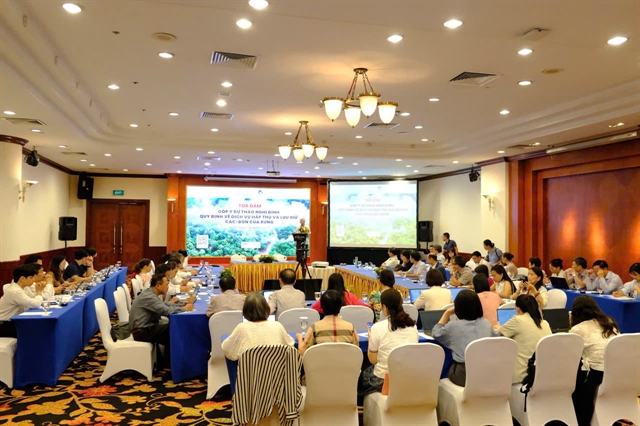 Environment
Environment

 |
| Participants at the workshop. — VNS Photo Tố Như |
HÀ NỘI — A new draft decree on forest carbon sequestration and storage services is expected to unlock fresh financial resources for forest protection and development by allowing for the first time the domestic trade of forest-based carbon credits.
Presented to a workshop in Hà Nội on Tuesday, the draft aims to provide a legal framework for communities, households and businesses to participate in the carbon market.
According to Associate Professor Dr Nguyễn Bá Ngãi, Vice Chairman and Secretary General of the Việt Nam Forest Owners Association, the draft separates two mechanisms, carbon service provision and carbon credit trading, to ensure transparency and legal consistency.
Under the service model, forest owners and carbon emitters will sign contractual agreements with State-regulated pricing, mirroring Việt Nam’s existing payment for forest environmental services. In contrast, market-based transactions will allow businesses to buy, sell or offset credits freely, with prices set by market forces or auctions, a model aligned with current climate regulations.
“If these two mechanisms aren’t clearly defined, it may cause conflicts in pricing and benefit-sharing,” Dr Ngãi said, stressing the need to harmonise the Forestry Law and the Environmental Protection Law.
Director of the Department of Forestry, Dr Trần Quang Bảo, said the decree simplified procedures for forest owners and enhanced their autonomy to trade or transfer credits, including with international partners. He also highlighted the potential to engage private investors and businesses with the financial and technical capacity to boost forest carbon stocks.
Forestry is currently Việt Nam’s only sector capable of generating negative emissions. However, not all credits can be traded, as some must be retained to meet the country’s Nationally Determined Contribution targets.
Dr Tô Xuân Phúc, executive director of the Policy, Trade, and Finance Programme of Forest Trends, said attracting private investment, both domestic and international, would be key to scaling up afforestation and restoration efforts. He urged flexible provisions to allow households with long-term land use rights to freely join the market through partnerships or direct participation.
The draft decree introduces Việt Nam’s first domestic forest carbon standard and sets out how credits are calculated, traded, and managed. Both public and private forest owners, from commune-level authorities to individuals and businesses, may act as service providers.
Credits will be traded via contracts or a national exchange platform, with initial pricing set by provincial authorities based on ministerial guidance. Revenue will be distributed through direct payments or forest protection funds, with income for households and communities shared based on forest area contributions.
The Ministry of Agriculture and Environment will lead the development of standards and oversee monitoring, while the Ministry of Finance will help set pricing methods. Provincial authorities will manage implementation and reporting. — VNS




